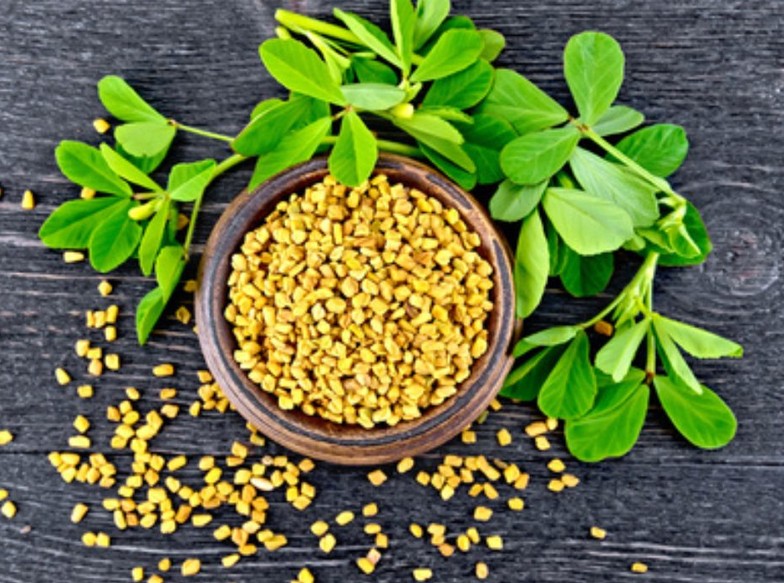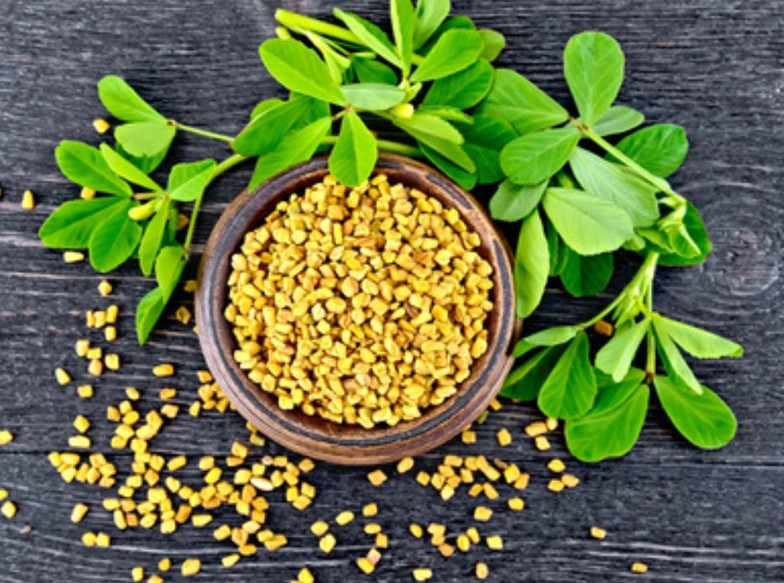Fenugreek
Fenugreek (Trigonella foenum-graecum) is a plant in the Fabaceae family, native to the Mediterranean region, Western Asia, and North Africa. It is an annual herb that grows up to 60 cm tall and has green leaves, white flowers, and long, slender pods that contain small, golden-brown seeds.
Fenugreek is cultivated for its seeds, which are used as a spice and for medicinal purposes. The plant is also sometimes used as a forage crop for livestock. Fenugreek is relatively easy to grow and can be grown in a range of climates, but it prefers a warm, sunny location and well-drained soil.
Fenugreek is an herb and a spice commonly used in Indian and Middle Eastern cuisines. It has a slightly bitter taste and a strong aroma, and is often used in curry powders, pickles, and chutneys. Fenugreek seeds and leaves are also used for medicinal purposes, including as a natural remedy for low milk supply in breastfeeding mothers and for managing blood sugar levels in people with diabetes.
Fenugreek is bitter and warm. It is selectively targeting the kidney and liver energy channel(we call jingluo is energy channel here).
Fenugreek can warm the kidney, dispel cold, relieve pain. It is used for kidney fire deficiency and coldness, cold pain in the lower abdomen, small intestinal hernia, and cold-damp beriberi.
Fenugreek (Trigonella foenum-graecum) seeds contain a variety of chemical compounds, including:
- Alkaloids, such as trigonelline and choline
- Saponins, such as diosgenin and yamogenin
- Flavonoids, such as vitexin, isovitexin, and orientin
- Coumarins, such as scopoletin and umbelliferone
- Steroids, such as beta-sitosterol and stigmasterol
- Essential oils, including alpha-pinene, limonene, and beta-pinene
These compounds are responsible for the various health benefits associated with fenugreek, such as its ability to reduce inflammation, improve digestion, and regulate blood sugar levels.
Fenugreek (Trigonella foenum-graecum) seeds have several nutritional benefits. Some of these include:
- High in fiber: Fenugreek seeds are an excellent source of dietary fiber, which can help promote digestive health, regulate blood sugar levels, and lower cholesterol levels.
- Rich in iron: Fenugreek seeds are a good source of iron, which is important for the production of red blood cells and the prevention of anemia.
- Contains essential minerals: Fenugreek seeds are rich in minerals like magnesium, manganese, and copper, which play important roles in various bodily functions, such as nerve function, bone health, and energy production.
- May help lower cholesterol: Some studies suggest that fenugreek may help lower levels of LDL (bad) cholesterol and triglycerides, which are risk factors for heart disease.
- May help regulate blood sugar: Fenugreek may help lower blood sugar levels in people with diabetes by increasing insulin sensitivity and reducing insulin resistance.
- May have anti-inflammatory properties: Some of the compounds in fenugreek seeds have been shown to have anti-inflammatory effects, which may help reduce the risk of chronic diseases like heart disease and cancer.
Overall, fenugreek seeds are a nutritious and versatile food that can be used in a variety of dishes to provide flavor and health benefits.
Fenugreek (Trigonella foenum-graecum) seeds have a range of pharmacological effects due to their chemical composition. Some of the pharmacological properties of fenugreek include:
- Hypoglycemic effect: Fenugreek seeds contain several bioactive compounds, including saponins and fibers, which have been shown to reduce blood sugar levels and improve insulin sensitivity in people with diabetes.
- Anti-inflammatory effect: Some of the compounds in fenugreek seeds have anti-inflammatory effects, which may help reduce inflammation in the body and reduce the risk of chronic diseases like heart disease and cancer.
- Antioxidant effect: Fenugreek seeds contain antioxidants, such as flavonoids, which can help protect the body against damage from free radicals and reduce the risk of chronic diseases.
- Galactagogue effect: Fenugreek seeds are traditionally used as a galactagogue, meaning they can help increase milk production in breastfeeding mothers.
- Hypolipidemic effect: Fenugreek seeds may help reduce levels of LDL (bad) cholesterol and triglycerides, which are risk factors for heart disease.
- Anti-cancer effect: Some studies suggest that fenugreek seeds may have anti-cancer properties, although more research is needed in this area.
These pharmacological effects are due to the presence of various bioactive compounds in fenugreek seeds, such as saponins, flavonoids, and alkaloids. However, further research is needed to fully understand the pharmacology of fenugreek and its potential health benefits.
Who should take Fenugreek
Fenugreek (Trigonella foenum-graecum) seeds can be beneficial for various groups of people, including:
- People with diabetes: Fenugreek seeds may help reduce blood sugar levels and improve insulin sensitivity in people with diabetes. However, people with diabetes should consult with a healthcare professional before taking fenugreek supplements, as it can interact with diabetes medications and cause hypoglycemia (low blood sugar).
- Breastfeeding women: Fenugreek seeds are traditionally used as a galactagogue to increase milk production in breastfeeding women. However, women who are breastfeeding should consult with a healthcare professional before taking fenugreek supplements.
- People with high cholesterol: Fenugreek seeds may help reduce levels of LDL (bad) cholesterol and triglycerides, which are risk factors for heart disease.
- People with digestive issues: Fenugreek seeds are high in fiber, which can help promote digestive health and relieve constipation.
- People with inflammatory conditions: Some of the compounds in fenugreek seeds have anti-inflammatory effects, which may help reduce inflammation in the body and alleviate symptoms of inflammatory conditions like arthritis.
- Athletes and bodybuilders: Fenugreek seeds may help increase testosterone levels and improve athletic performance, although more research is needed in this area.
However, as with any dietary supplement, it is always best to consult with a healthcare professional before taking fenugreek, especially if you have any underlying health conditions or are taking medication.
Who should not take Fenugreek
While fenugreek (Trigonella foenum-graecum) seeds are generally considered safe for most people, there are certain groups of people who should avoid or limit their intake of fenugreek. These include:
- Pregnant women: Fenugreek seeds may have uterine stimulant effects, which can be harmful during pregnancy. Therefore, pregnant women should avoid fenugreek supplements or large amounts of fenugreek seeds in their diet.
- Breastfeeding women: While fenugreek is traditionally used as a galactagogue to increase milk production in breastfeeding women, there is limited scientific evidence to support its use. Women who are breastfeeding should consult with a healthcare professional before taking fenugreek supplements.
- People taking blood-thinning medication: Fenugreek seeds may have blood-thinning properties and can interact with anticoagulant medication, such as warfarin. People taking blood-thinning medication should consult with a healthcare professional before taking fenugreek supplements.
- People with allergies: Some people may be allergic to fenugreek, which can cause symptoms such as itching, hives, and difficulty breathing. People with known allergies to fenugreek should avoid its use.
- People with diabetes: While fenugreek may be helpful in reducing blood sugar levels in people with diabetes, it can also interact with diabetes medications and cause hypoglycemia (low blood sugar). People with diabetes should consult with a healthcare professional before taking fenugreek supplements.
As with any dietary supplement, it is always best to consult with a healthcare professional before taking fenugreek, especially if you have any underlying health conditions or are taking medication.
In Person With Heshoutang Members
With Heshoutang Online Members
Fill Out the Questionnaire by yourself
When you subscribe to the blog, we will send you an e-mail when there are new updates on the site so you wouldn't miss them.
















Comments